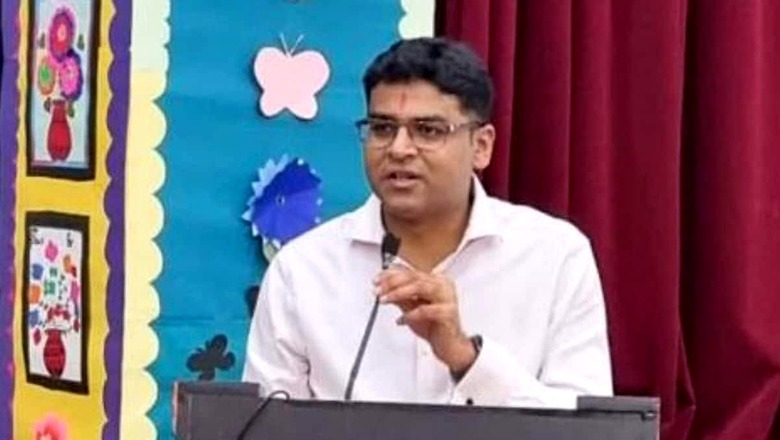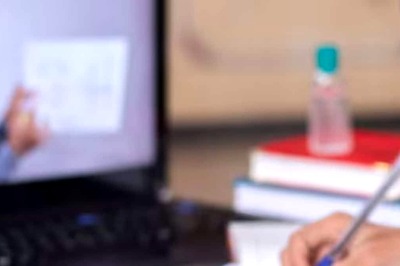
views
The Central Board for Secondary Education (CBSE) has released the new report cards — Holistic Progress Cards (HPC) — for nursery to class 2 while the format is still being worked out for higher classes. The Board plans to have a pilot run of the holistic assessment for all classes this August-September, CBSE Secretary Himanshu Gupta told News18 in an interview.
The new progress cards are a way to evaluate students qualitatively and not just based on their academic performance. The reform has been introduced in line with the new National Education Policy (NEP), 2020, which envisaged apart from academic performance, an all-round assessment of students including abilities and aspects such as personal growth, problem-solving, critical thinking, communication, and collaboration, creativity and innovation, self-reflection and emotional application in classrooms.
For nursery to primary classes, the progress card will mainly have qualitative feedback from the teachers and the children themselves, their classmates, and parents, who are an integral part of foundational learning.
Gupta, a 2012-batch IAS officer of the AGMUT cadre was appointed as the Board’s secretary in December 2023. Before this, he served as the director (Education) in the Department of Education, Delhi government. With education being his forte, Gupta said that in 2024-25, his major focus will be on teacher training, developing new training modules, introducing new subjects in schools such as Artificial Intelligence (AI), and introducing vocational skills from class 6 onwards this academic year. He also talked about constantly improving the quality of education by keeping checks on schools’ practices with the use of tech and AI in detecting dummy schools and irregularities in internal assessment.
Edited Excerpts:
Q. When are the new Holistic Progress Cards (HPC) expected to be introduced for assessment in schools?
A. We have released the Holistic Progress Cards (HPC) for nursery to class 2 while it’s still being developed for higher classes and hopefully, that too will be released this year. For the primary classes, in the HPC, the assessment will not just be by the teachers, but from peers like what they feel about their fellow classmates, what the children think about their selves as well as from parents. Holistic assessment is used by many other countries such as Finland, which has one of the best-known education systems in the world. For higher classes, it will have different components that are competency-based as well as learning outcomes including aspects such as interpersonal skills, decision-making, innovation, and application of theory to real-life situations, among others. We will be conducting a teacher’s training for the same and will have a pilot run for all classes this August-September.
Q. What are your focus areas in 2024-25?
A. There will be a huge focus on teacher training in terms of implementing the National Curriculum Framework for School Education (NCF-SE). Besides, new subjects such as AI and Machine Learning (ML) are being introduced in schools. A lot of focus will be on introducing vocational skills from class 6 onwards, so we are waiting for books, which are being developed by the National Council for Educational Research and Training (NCERT). I believe skills like carpentry, electric works, and gardening are such that can be introduced at early stages, but it will depend on how the NCERT is developing these books and what activities they include for introducing skills for middle school classes. Then we will devise teacher-training modules accordingly and then it will be launched in schools. NEP is the guiding document that has art-based learning, play-based learning, and many other aspects, so modules are being developed based on that, and teacher training is one area, that will remain in focus throughout. Meanwhile, the new session has started and the academics department has already issued a circular to all the schools saying that the books that were used last year will be used this year too, as we have not received the revised books from NCERT yet. The Council has informed us that the books were in the finalisation stage.
Q. The Board has cracked down on dummy schools, what prompted the action?
A. We have been looking at data and for quite some time now schools’ principals have been informing us that there are dummy schools functioning all over, including the national capital, and that students after class 10 would ask for a transfer certificate (TC) saying they were going out for coaching for various entrance exams to different places such as Kota and others, which is when we decided that we must act on this. So, December 2022 inspections were carried out and show-cause notices were issued to these schools. We saw the responses filed by the schools and then action was taken against them. We disaffiliated 20 schools and downgraded three others across the country. Overall, we had 70 teachers in different teams sent to 35 schools across states for inspection, of which, irregularities were found in 23 of them. Of all the places, Delhi was on top with five such schools, and then there were other states such as Uttar Pradesh and Kerala, among others.
Q. How does the Board plan to continue the crackdown and ensure no such schools function?
A. Yes, we plan to continue the crackdown in a strong way next year as well. We are going to use Artificial Intelligence (AI) and all other mechanisms where there is an abrupt increase in the number of students joining classes 11 and 12 vis-à-vis classes 9 and 10. We are going to take stern action. Most of these are private schools with some operating as big chains such as Rahul International. Then a few of them are standalone schools. Initially, they get affiliation, but later on, add more sections even if they don’t have enough infrastructure. We checked the numbers through our own system, which showed a massive increase in the number of students taking admission in classes 11 and 12, which was a huge variation from the number of students enrolled in classes 9 and 10.
Q. How are you using AI? How the Board is using tech to check on irregularities?
A. We have our own IT platform through which we are using AI to identify the schools. We have a dedicated IT team of 30 experts that uses different software mechanisms to scan through data to check on irregularities as well as analyse changes, and trends for various academic practices such as board results, marks obtained by students during the internal and external assessment, and if schools are fudging data on internal assessment, among others. If the system detects a substantial variation in the internal and external assessment marks, for example, if a student has got full marks in practical but performs below average in theory, it shows the difference. We have made a list and issued notices to such schools asking them to explain the variation. The software for this came last year and within the first three months of this year, we have found around 10,000 students of class 12 with such variation in marks across the country. The schools have been given a warning and if they continue with the practice, they will have to face penalties for the same. The number is substantial given that over 17 lakh students from CBSE appear for class 12 board exams every year.

















Comments
0 comment